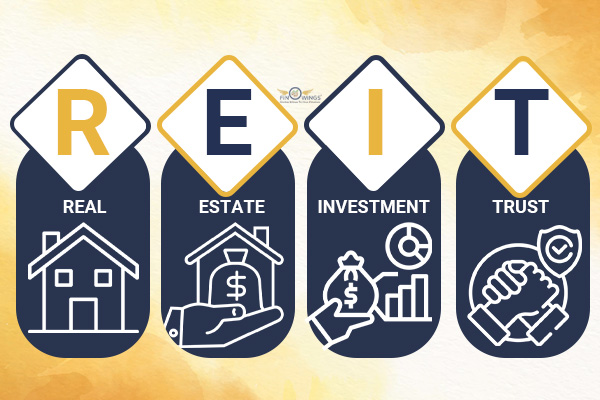Home >> Blog >> Secure your financial future with REIT Investment
Secure your financial future with REIT Investment

Table of Contents
- 1. Introduction
- 2. Real Estate Investment Trusts (REITs): What Are They?
- 3. What are the types of REITs In India?
- 4. Advantages and Disadvantages of REITs Investment
- 5. Who should put money into Indian Real Estate Investment Trusts (REITs)?
- 6. How To Invest REITs In India?
- 7. Factors To Consider While Investing In REITs In India
- 8. Summing Up
1. Introduction
The most important aspect of the growth of any developing economy is infrastructure. The growth of an economy is possible only when that country's infrastructure is well-built. The role of the real estate sector also matters a lot. In other words, infrastructure and real estate are of fundamental importance in the overall development of any country. Do you know that real estate and infrastructure have contributed significantly to India's economic progress? That's why the government regularly promotes them.
The well-planned infrastructure of any country contributes continuously to the foreign investment of that country and increases the capital required for the sustainable development of that country's economy. Today you will find different investment options in the market, but the Real Estate Sector for investment is as popular as before. It has come in the new form of Real Estate Investment Trusts or REITs.
REITs can prove to be very beneficial for new investors. The significant feature of REITs is that it comes with low portfolio volatility. Also, it ensures higher dividends and consistent wealth accumulation. In addition, it is a listed entity, so you can easily buy and sell. Another highlight of REITs is that it's effective in hedging against inflation.
We all know that the real estate industry is closely related to the business world, and the rising housing demand has created new investment opportunities. You may learn a lot about Real Estate Investment Trusts (REITs) in this blog, including what they are, how to invest in REITs, why you should, and other information. Keep reading.
2. Real Estate Investment Trusts (REITs): What Are They?
It is a financial instrument or business that owns, manages, or finances real estate that generates revenue. Real estate investment trusts (REITs) are the same as mutual funds. As mutual funds hold stocks, REITs hold and operate a portfolio of rent-generating commercial buildings. REITs mainly pool investors' money together and use it to buy real estate to generate income. REITs manage these properties in such a way as to generate rental income and capital appreciation.
Historically in India, investors used to buy property or land through property brokers or real estate developers. Investors had to rely on the long-term market price to get returns on that asset. But, now the market has changed.
REITs in India often invest in properties such as office space, malls, warehouses, and institutions and generate rental income from them. For your information, REITs in India mainly focus on office properties. However, gradually, REITs have started investing in other assets as well. Through this, investors can earn regular income in the form of dividends. The REITs company pays this dividend out of the rental income.
You must invest in REITs if you are passionate about investing. Since the minimum investment is not high, one can invest in it. A few years back, REITs were introduced in India when its minimum investment limit was INR 50,000. However, SEBI later reduced the minimum investment limit for one unit lot size to 10000-15000 INR. It was done to provide more listings and increase liquidity in the REIT space.
3. What are the types of REITs In India?
3.1 Equity REITs
Equity REITs are the most popular REITs in India. Equity REITs mainly invest in residential complexes, hotels, offices, and industrial estates. They first buy, manage and establish real estate and then sell it. In this, the income is mainly generated through the sale and rent of properties, and the earned income is distributed among the investors in the form of dividends.
3.2 Mortgage REITs
Mortgage REITs are also known as mREITs. Mortgage REITs lend money to businesses engaged in the real estate industry. Mortgage REITs or mREITs do not generate income from rent but from EMI or mortgage payments. Charges interest in exchange for mortgage-based properties and shares that interest with all its investors. Somewhere they work as debt mutual funds.
3.3 Retail REITs
The popularity of retail REITs investment in India is gradually increasing. Under this, investments are made in retail segments like shopping malls, hypermarkets, supermarkets, and grocery stores. Retail REITs, on the other hand, do not manage these stores directly; instead, they offer space to retail tenants in exchange for which they receive money in the form of returns based on the retailer's success.
3.4 Private REITs
Since private REITs are not registered with SEBI and are also not listed on any stock exchange, it has a narrow number of investors who operate as private placements.
3.5 Healthcare REITs
Healthcare REITs primarily invest in real estate for health clinics, hospitals, medical establishments, etc. As the demand for healthcare services is increasing daily and health is a sector that will never shut down, healthcare REITs present a good investment option for investors.
3.6 Hybrid REITs
In this, the investor earns dividends both through rent and interest. As a result, hybrid REITs are in high demand in the market and invest in both equity and mortgage REITs.
4. Advantages and Disadvantages of REITs Investment
| Advantages Of REITs | Disadvantages Of REITs |
|
|
5. Who should put money into Indian Real Estate Investment Trusts (REITs)?
-
REIT real estate can be purchased by investors who want to diversify their portfolios and participate in the real estate market at a reasonable cost. REITs also act as an inflation hedge. You can consider investing in them if you're looking for alternatives to stocks and bonds as investment vehicles.
-
You can invest in it even with very little capital. SEBI recently reduced the minimum investment in REITs India to just INR 10000-15000 and reduced the lot size to one unit. So that even a common investor can invest in the real estate sector.
-
REITs Investment pay regular dividends to their investors. Investing in Real Estate Investment Trusts can benefit you if you are also looking for consistent income. But remember, investing in the real estate sector is a long-term investment; only then can you earn profits. Consider investing in REITs only if you are ready for a long-term investment.
6. How To Invest REITs In India?
-
Like ETFs, REITs are listed and traded on stock exchanges. Investors can invest in REITs through a Demat account, and the REIT unit price is subject to change. The price of REITs varies depending on the demand from the stock exchanges. Do you know that there are currently only 3 REIT options in India: Brookfield India Real Estate Trust, Mindspace Business Park REIT, and Embassy Office Park REIT? In this way, you can invest in REITs through stock exchanges.
-
You can also invest in REITs through mutual funds in India, but with only 3 Best REITs Stocks in India, investing through mutual funds is very limited. The risk of investment in this is also narrow. Investors looking for investment in international real estate can invest in Kotak International REIT Fund of Funds.
-
Many investors consider it to invest through IPO. One can also invest in REITs through IPO. Right now, there are not many options for REITs in the Indian market, due to which the IPO options are also very narrow. Investors can wait for the next IPO launch if they want.
7. Factors To Consider While Investing In REITs In India
-
Before investing in a REIT portfolio, checking whether the company's regular payments are accurate is crucial. Whether there is regularity in the cash flow of the company or not.
-
Before investing, determine what percentage of that entire real estate is rented out. If that company has a good occupancy percentage, it indicates the success and stability of that portfolio.
-
The geographical aspect of each region is different. When you choose to invest in REITs, keep in mind in which city your REIT property is located. How is the development around that real estate?
-
When you want to invest in REITs in India before that, pay attention to its dividend. It reflects the health of that portfolio. A higher portfolio dividend yield means that the investor gets good returns.
-
You also evaluate the past performance of that REITs portfolio. Look at the stock performance of the past year. If the stock has performed well, you will choose that option.
8. Summing Up
REITs investments are a lucrative and innovative way for Indians to invest in the Real Estate Sector. Even novice investors can improve their investment portfolio by investing in the Real Estate Sector through REITs. Since SEBI and the Indian Stock Exchange list it, it is a relatively safe investment option. It is easy to invest in and provides liquidity to your portfolio. Investors who want exposure by investing in real estate can go ahead with REITs. But before taking any decision, do your research, understand your risk appetite and then make an investment decision.
Frequently Asked Questions
Real estate investment trusts (REITs) are the same as mutual funds. As mutual funds hold stocks, REITs hold and operate a portfolio of rent-generating commercial buildings. REITs mainly pool investors' money together and use it to buy real estate to generate income. REITs manage these properties in such a way as to generate rental income and capital appreciation.
You can also invest in REITs through mutual funds in India, but with only 3 REITs in India, investing through mutual funds is very limited. The risk of investment in this is also narrow. Many investors consider it to invest through IPO. One can also invest in REITs through IPO.
The first REIT listed in India was Embassy REIT, which was listed in 2019.










.webp)







